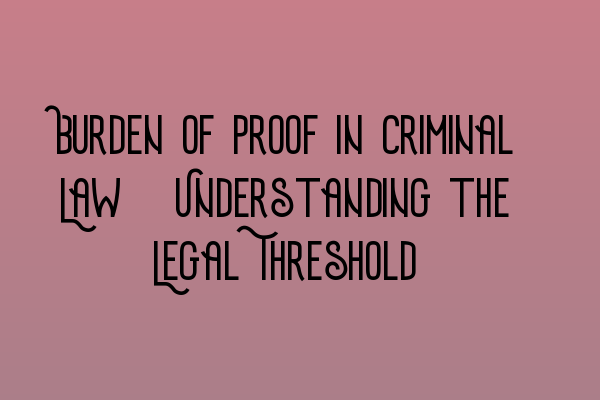Burden of Proof in Criminal Law: Understanding the Legal Threshold
When it comes to criminal law, one of the fundamental principles that guides the legal process is the concept of the burden of proof. The burden of proof refers to the obligation of the prosecution to prove beyond a reasonable doubt that the accused is guilty of the alleged crime. In other words, the burden of proof lies on the prosecution to establish the guilt of the accused.
The burden of proof is a cornerstone of criminal justice, ensuring that individuals are not wrongfully convicted by mere speculation or suspicion. It is the responsibility of the prosecution to present credible evidence and convince the court that the accused is guilty beyond a reasonable doubt.
In the United Kingdom, the burden of proof in criminal cases is set at a high threshold. This means that the prosecution must present evidence that is robust, reliable, and convincing. It is not enough for the evidence to merely suggest the accused’s guilt; it must establish it with a high degree of certainty.
The legal threshold for the burden of proof in criminal cases is rooted in the presumption of innocence. This principle holds that every individual is presumed innocent until proven guilty. The burden of proof ensures that the presumption of innocence is respected and protected, and that individuals are not unfairly penalized without sufficient evidence.
In criminal cases, all of the essential elements of the offense charged must be proven beyond a reasonable doubt. This includes proving the accused’s actus reus (the guilty act), mens rea (the guilty mind), and any other necessary elements specific to the offense. The prosecution must present evidence that is sufficient to remove any reasonable doubt about the accused’s guilt.
Throughout the trial process, the burden of proof remains with the prosecution. It is not the responsibility of the accused to prove their innocence. However, the accused may present a defense to challenge the evidence presented by the prosecution and introduce reasonable doubt.
Understanding the burden of proof is crucial for both prosecutors and defense attorneys. Prosecutors need to gather sufficient evidence to meet the high threshold, while defense attorneys must strategically challenge the prosecution’s case to cast doubt on their evidence.
As aspiring legal professionals, it is essential to have a comprehensive understanding of the burden of proof. Whether you are preparing for the SQE 1 exams or the SQE 2 exams, a strong grasp of criminal law and the burden of proof will be invaluable.
For comprehensive preparation materials for the SQE 1 exams, including practice exam questions, consider enrolling in our SQE 1 Practice Exam Questions course. This course will provide you with the necessary resources to improve your knowledge and skills in criminal law.
If you are looking for practice mocks for the SQE 1 exams, consider our SQE 1 Practice Mocks FLK1 FLK2. These practice mocks will help you simulate real exam conditions and refine your understanding of criminal law.
For those preparing for the SQE 2 exams, we offer comprehensive SQE 2 Preparation Courses that cover all the necessary knowledge and skills required for success.
Stay updated with the latest SRA SQE Exam Dates to ensure you are well-prepared and confident on your exam day.
In conclusion, the burden of proof is a critical concept in criminal law that ensures the fairness and integrity of the legal process. Understanding this legal threshold is essential for both prosecutors and defense attorneys. By mastering the burden of proof, aspiring legal professionals can effectively navigate criminal law cases and contribute to the pursuit of justice.
